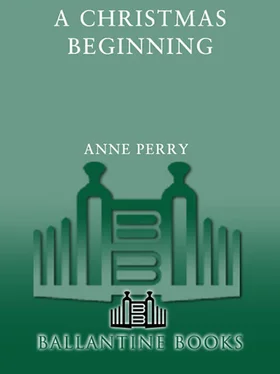Finally Trimby stood up awkwardly, his legs stiff from kneeling, his balance a little uncertain.
“No later than midnight,” he said hoarsely. He coughed and began again. “Far as I can tell from the rigor mortis. But you can see that yourself with the frost, I expect. Cold, exposure makes a difference. Look for whoever saw her last, if you can trust them. Can’t … can’t make a wound like that without getting blood on yourself. She didn’t fight.” His voice broke and he took a long, difficult moment to regain his self-control. “Nothing much else I can tell you. Can’t learn anything more from this. I’ll get her out of here, get her … decent.” He turned to go.
“Doctor …” Runcorn called out.
Trimby waved a hand at him impatiently. “You can see as much as I can. This is your business, not mine.” He continued to walk rapidly between the gravestones.
Runcorn’s legs were longer and he caught up with him. “It’s not all you can tell me,” he said, matching his step to Trimby’s. “You know her, tell me something about her. Who would have done this?”
“A raving madman!” Trimby snapped back without turning to look at him or slacken his pace.
Runcorn snatched his arm and pulled him up short, swinging him around a little. It was a thing he had never done before in all the violent and tragic cases he had ever dealt with. His own emotions were more deeply wrenched than he had imagined. “No, it was not a madman,” he said savagely. “It was someone she knew and was not afraid of. You know that as well as I do. She was facing him, she wasn’t running away, and she didn’t fight back because she wasn’t expecting him to strike her. Why was she here anyway? Who would she meet in a graveyard alone, late at night?”
Trimby stared at him, angry and defensive. “What kind of world do you live in where a man who would do that to a woman is considered sane?” he asked, his voice trembling.
Runcorn saw the profound emotion in him, the bewilderment and the sense of loss far deeper than what he must have felt from the expected deaths he encountered in his practice from time to time. Olivia had presumably been his patient and he might have known her all her life. Runcorn answered honestly. “When we say ‘madman,’ we mean someone unknown to us, who acts without reason, attacking at random, someone outside the world we understand. This wasn’t someone like that, and I think you know it.”
Trimby lowered his gaze. “If there were anything I could tell you, I would,” he replied. “I have no idea who it was, or why this happened. That is your job to find out, God help you.” And he turned and strode away through the last of the gravestones, leaving Runcorn alone, cold, and spattered by the first heavy drops of rain.

It was a miserable day of small duties before Runcorn finally met again with Constable Warner and told him what Trimby had said. The medical evidence, such as it was, confirmed his own deduction, but added nothing that was of help. Olivia Costain had been stabbed in the stomach with a broad blade. The single thrust had severed the artery and she had bled to death within moments, falling backwards from where she had been standing. As Runcorn had supposed, there were no defensive wounds on her hands or arms, or anywhere else on her body.
“She probably died before midnight,” he finished.
Warner looked tired, his eyes red-rimmed as if he had been sleepless far longer than one interminable day. They sat at the same kitchen table as they had in the morning, again with a pot of tea between them.
“I told the vicar,” he said miserably. “Poor man was shattered. I think Mrs. Costain took it even harder. Very close, they were.”
“Did you find out who was the last to see Miss Costain alone?” Runcorn asked, bringing him back to the facts. He had seen constables profoundly shaken by death before. The first few times were the hardest, especially when the victim was particularly vulnerable, young, old, or in some other way helpless. It helped to concentrate on the little they could do now that was of use.
Warner looked up. “Oh. Yes. Housekeeper saw her leave at about ten, or a few minutes after. Said she was just going for a walk. Seems she did that quite often, walked alone, even after dark. Didn’t go far.”
“So there are two hours during which she could have been killed?”
“Yes, seems like it,” Warner agreed. “I asked everyone where they were. Not a lot of help. The vicar was in his study, Mrs. Costain was in the library reading until she went to bed at about eleven. Their neighbors in the big house up the road would be Mr. John Barclay and his sister, Mrs. Ewart, widow so they say. He went out to visit a friend, but he walked home alone and didn’t disturb the servants when he got in. So there’s no proof where he was after about half past ten. She was in bed, but she dismissed her maid, so we’ve only her word.” Warner looked more and more unhappy. “And the curate, Kelsall, lives alone in a little cottage half a mile away. Mr. Newbridge, who had been courting Miss Olivia until recently, lives about two miles away, and he was working in his study until eleven. But he dismissed his manservant after dinner, so we have only his word also.”
“Reasonable,” Runcorn admitted reluctantly. “I couldn’t account for myself either. A late walk on a clear winter evening is a natural thing to do. Have a look at the stars. You can really see them here. And most people who have servants let them go if there’s no need to keep them up. Anybody see her after that? See anybody about, or hear anything? What about servants, courting maybe? Any neighbors up?”
Warner shook his head. “Asked anywhere I knew of, Mr. Runcorn, and not a thing I can see as helps us at all. All the other neighbors so far can say where they were, ’cos they all have families, or servants as saw them. Not that they all knew Miss Olivia that well, except in passing, as it were. Terribly shaken up, they were. We’ve never had anything like that here. It’s …” he stopped, lost for words.
He shook his head slowly, avoiding Runcorn’s eyes. “Got a message, chief constable’s going to be here sometime late tomorrow. He’ll take over then. Can’t say as I’m sorry. This is not the kind of thing I know how to handle, Mr. Runcorn. The odd robbery now and then, even a barn burning or a real bad fight I can deal with, but this is different. Got everybody frightened, and sick with grief, it has. Glad enough to have Sir Alan take charge of it. But I’m obliged to you for your help. We’ll hand over a tidy investigation, evidence all straight and done right, thanks to you.” He smiled very slightly, his shoulders easing a little, his color ashen as if at last he could let go of some of the burden which he had carried today. Only yesterday he could not have even thought of it in his worst nightmare. “I’m sure Sir Alan would want to thank you himself, but for us here, I’m grateful, Mr. Runcorn.”
Runcorn knew it would be this way, he had no jurisdiction in Anglesey, no standing beyond that of any other responsible citizen. And yet he felt absurdly disappointed. It was not that he wanted work. The case was tragic, nothing about it was obvious, and he certainly had no idea who could have done it, or why. But he wanted to see it to the end, he wanted to find out who had destroyed a young woman who had been uniquely alive and full of grace. And perhaps also he had wanted to be of value, here so very close to Melisande, not merely another onlooker. Dealing with violence and fear was the one thing he was good at. It was where his skills were truly valued.
But of course the chief constable was coming. It was too grave a case for him not to. It was not even twenty-four hours since the murder, and panic was already rising, fear cold and dark, wakening like the wind rattling at the windows. Except that the wind could be shut out, and fear entered in spite of all the locks and bars in the world.
Читать дальше











